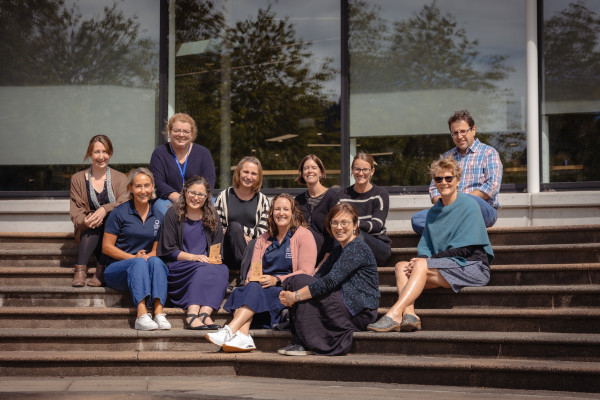- Tūhono home Hoki ki Tūhono
-
- Staff Directory
- Chief Executive Office Auckland International Office Corporate Services Finance Campus Services Functions and Catering Information Systems and Support Marketing, Communications and Engagement Learner Journey Academic Registry International Learner Services Te Punaka Ōwheo
- Learner Experience Academic Excellence Central Campus College of Community Development and Personal Wellbeing College of Engineering, Construction and Living Sciences College of Health College of Work Based Learning Open Education Resource/OERu Research and Postgraduate Studies Te Maru Pumanawa | College of Creative Practice and Enterprise
- Māori Development and Kaitohutohu Office People, Culture & Safety People and Culture Childcare Centre Te Ama Ako | Learning and Teaching Development Wellbeing and Safety Auckland Staff Directory Executive Office Academic Corporate Services Marketing and Business Development Human Resources Campus Quality and Programme Development
-
 Our people make a better world
Our people make a better world
We build the capabilities of individuals, organisations and communities and help them to realise their potential.
Staff Directory
-
- Tools
- Academic Integrity Declaration Form AIC applications dashboard Approved programmes Approved programme fees Centralised assessement repository Chemwatch Course evaluation and surveys CRM applications CRM customer service hub Delegations policy/process Disability and neurodiversity Dynamics 365 (CRM) EBS Ontrack EBS Report Email security personal portal Employment Matters / Solarworkplace / Performance reviews eTaxi eTV
- Financial variance reporting Hidden Disabilities Sunflower programme FCM travel intranet InPlace International entry requirements Knowledgebase articles Learner support dashboards Linkedin Learning Log a job with Marketing Login as an applicant Media consent form Microsoft 365 Moderation App Moodle OP Docs OP Docs - Publishing OP Image Libraries Performance Excellence Portal Product Evaluation Panel
- Policy Library Privacy Programme and course design/development Qualtrics XM RDS Remote access support portal Research Database Robertson Library Staff FAQs about graduation Status of Programmes Student intranet (Kāpehu) Study Abroad info for learners Taha Talks (videos for students) Tūhauora I Wellbeing resources Uniprint Vault Webexpenses Auckland tools
-
 Vault
Had an accident or near miss?
Log it here
Vault
Had an accident or near miss?
Log it here
-
- Communities
- Community AI Steering Committee Ally Network EBS Community of Interest EdTech Champions Health & Wellbeing Research Internal Evaluation Neurodiversity Professional Team Professoriate Proud@OP Student Support Website Advisory Group Web Champions Working under the Rainbow Project Learner Capability Trade Training Centre
- Committee Academic Committee Animals@OP Diversity and Equity Doctor of Professional Practice Committee Kaunihera Whakahaere - Leadership Council Internal Evaluation Learning & Teaching Leadership Team Library Committee Mental Health and Wellbeing Advisory Group Otago Polytechnic Board of Directors Pastoral Care Code Committee Programme Approvals Committee Research and Postgraduate Committee Research Ethics Committee Staff Subcommittee
- Think Tanks Mātauraka Our learners achieve educational success Pūtea Our financial success Tākata Our people, our team, our community Tiriti Our active commitment as a Treaty partner Tūroa Our commitment to be a sustainable and responsive organisation
-
 Create a community
Create a community
Do you have a community, committee or project that you'd like represented here?
Communities
-
- About OP
- Keep up to date All news All events All notices All blogs Share your info Create a news article Create an event Create a notice Create a blog
- Community and Partnerships Alumni and friends Education Foundation Operational information Academic calendar 2025 Academic calendar 2026 Current vacancies Dunedin campus map Our policies Topical FAQs
- Who we are About OP Commemorative sites Māori Strategic Framework OP merchandise Our history Our strategic priorities Pasifika Strategic Framework (2025-2030) Vision and Values Working for us OP job opportunities Wellbeing Calendar Working at OP
-
New Zealand: 0800 762 786
contact us
International: +64 3 477 3014
Māmā
Author: Caitlin Donnelly
Supervisors: Jane Venis
26 February 2021
Donnelly, C. (2021). Māmā. (Unpublished Master's dissertation, Dunedin School of Art, Otago Polytechnic).
Abstract
Māmā is a transliterated te Reo (Māori language) word for mother; this, therefore, reflects my journey to connect with my Māori ancestry, as well as reflecting on my experiences as a mother. Until I discovered my Iwi, I thought I was only Pākehā. I chose this title because mārama means moon and talks of cycles and mātauraka refers to knowledge. These concepts are incorporated and celebrated in the kupu (word) Māmā and, therefore, in the mother's role and in my exploration for this project. Māmā is an identity project where I explore my growing understanding of being Kāi Tahu Māori, a mother, a woman in rural Aotearoa, New Zealand, and an adoptee. To do this, I will follow the whakataukī, Ka mua, ka muri, which means walking backwards into the future - the idea we should look to the past to inform the future.
This dissertation sits alongside the exhibition Māmā. This writing and the artwork and my mahi (work) are interconnected. This body of work expresses my reactions, thoughts, and feelings by not fitting the places I occupy. I am an estranged Māori, as I was raised as Pākehā. I am a non-local in rural Aotearoa, New Zealand; I am a rural woman with no farming background; I am a mother and female artist; I am a woman in Fire Emergency New Zealand; I am an adoptee. In exploring my identity, my work is fuel by my experiences. Sexism and racism are issues that have affected me personally. For this reason, the theoretical framework of Intersectional Feminism will help examine my main three areas of focus in this project which are Māori, Wāhine (Women), and Kowhaea (Mother). Therefore, Māmā is an exhibition of works made in response to these three critical areas experienced through my various roles and mahi. This project aims to voice and give agency to these issues via exploring histories, complexities, and intersections within them.
Keywords
feminism, post-colonialism, kaupapa Māori theory, intersectionality, identity
License
This abstract is available under a Creative Commons licence CC BY-NC-ND 4.0.
The dissertation is available at the Robertson Library, University of Otago.
